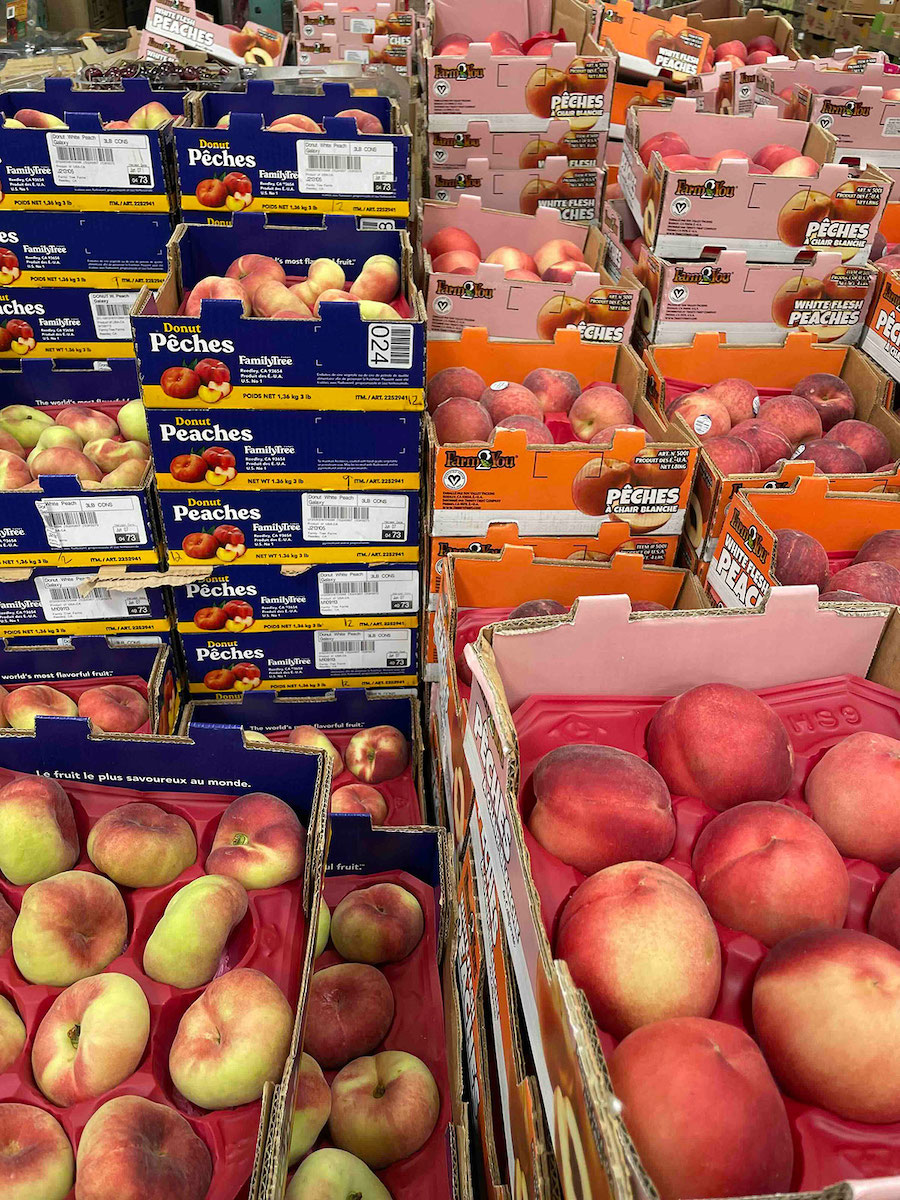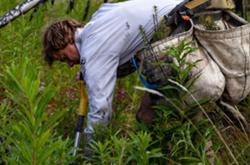There’s so much to love about summer in British Columbia: greenery, beaches, fresh produce. And most notably, peaches, the best fruit there is.
Admittedly, the stone fruit is widely available all through the year nowadays, thanks to imports from places as far-flung as Chile, Argentina, California and New Zealand. But it’s only irresistible from mid-July to early September, when B.C.’s 600-odd growers gift us with 4.6 million kilograms of velvety, sun-softened, fragrant and fully superior peaches.
Give me a peach in October, and I turn into J. Alfred Prufrock, who famously asked, “Do I dare to eat a peach?”
Give me a peach in July, when I know it’s a fresh Okanagan Redhaven, Glohaven or Cresthaven, picked in Penticton and bursting with flavour? I’ll eat the whole thing before asking myself if I’m hungry.
As I’ve written previously, B.C. fruit is not only downright delicious; it’s practically overabundant most summers.
Blink, and a bucket of blueberries seems to materialize in your house; the same goes for peaches, piled high in their biodegradable, pulp berry baskets and bought for a pittance wherever fresh produce is sold.
Not this summer, though.
Last winter was deeply unkind to the growers, as unseasonably warm weather triggered the fruit trees to bud well before they were supposed to, and following that, a cold snap in the southern Interior saw temperatures plunge to nearly 30 degrees below zero, freezing the delicate blossoms and wiping out most of this year’s B.C. harvest by Valentine’s Day.
‘A fairly disastrous year’
"Although there is expected to be some crops, it's down significantly,” BC Fruit Growers' Association general manager Glen Lucas said in February. “It's looking like a fairly disastrous year for growers. Some are wiped out and then others will have a good crop, but on average, it’s pretty much wiped out for cherries, and it’s worse for peaches, apricots, plums and nectarines."
Optimistically, Lucas said then, we were looking at losses of something like 75 per cent. But the losses turned out to be closer to 90 per cent, and for many farms, nearing 100.
“You'd be lucky to find a peach or nectarine from the U.S. border all the way to Vernon,” Pinder Dhaliwal, former president of BC Fruit Growers’ Association, told Castanet.
Kuljeet Kaler, owner of Osoyoos’s Peach Hill Farm Market, said that not one peach grew on their farm this year.
The same is true of Kelowna’s There and Back Again Farms, whose peaches are typically, famously huge. An 810-gram peach grown in 2016 set a since-broken Guinness World Record. This year, the farm yielded no peaches, giant or otherwise — a loss of roughly $80,000.
In addition to losing the bulk of the stone fruit, B.C.’s wine grape growers have said that the late winter deep-freeze also destroyed their whole crop. A report from Wine Growers British Columbia now estimates a harvest of one to three per cent of normal levels, “an almost complete writeoff of the 2024 vintage,” and revenue losses approaching a staggering $346 million.
B.C. farm markets now find themselves in the unenviable position of having to warn peachy-keen customers that the diamond of the season is a dud this time out.
“There’s just no way to soften the news about what comes in between the cherry and apple season, and I will give it to you straight,” said the owners of Abbotsford’s Lepp Farm Market in a chilling online update in mid-May.
“There will be no Okanagan stone fruit this year; the deep January freeze wiped out this summer’s crop of apricots, peaches, nectarines and plums in the entire Okanagan valley. It takes my breath away just to say that, and when I told our granddaughter the news, she burst into tears. ‘Nana, what do you mean there won’t be any peaches?’ You may be experiencing the same emotions.”
I absolutely am. It’s a shame about the apricots and nectarines, although the primary emotion I feel upon eating either is disappointment that it’s not a peach.
No peaches, though? Say it ain’t so, Nana. Summer is basically cancelled.
A fruitful reminder of what we’re losing
“It is the kind of thing we lose,” said Lenore Newman, a University of the Fraser Valley professor and the director of its Food and Agriculture Institute. “And I think we undervalue that part of the damage of climate change.”
This is, after all, just the latest in a brutal stretch for B.C. growers, who in the last several years have weathered a heat dome, rampant wildfires and, now, three consecutive winters of otherwise unprecedented cold.
"The ongoing climate change effects, highlighted by recent freeze events on B.C. farmers, is real and directly impacts those individuals and families that make up our industry," said Miles Prodan, Wine Growers BC president, in a statement.
I’d go further than that. It directly impacts all of us, though I wonder sometimes if our globalized market prevents us from fully engaging with just how directly it does.
Even among those who take the threat of climate change seriously on a grand scale, most of us are deeply disconnected from the harvest.
Ask a Vancouver local where their peaches are from and they're likely to echo that old song: “Peaches come from a can, they were put there by a man.”

You'll likely still be able to buy peaches this summer. Like Justin Bieber, we'll get our peaches down in Georgia or Washington, provided the Americans are willing to share. If they aren’t, we grow peaches in parts of Ontario.
But it won't be the same: more expensive, and much less delicious. There's a difference, after all, between locally grown fruit and fruit we've imported from elsewhere, in the same way there’s a massive distinction between a Hawaiian papaya consumed in Hawaii and one from a Pattison Group supermarket.
“If you want to bring a peach across the continent, you’ve got to pick it green, so that it's firm,” Newman said.
“That's a stark difference compared to the peach you grow if you know you're going to sell it close to where you're at. Because you grow a variety that actually tastes good, and that is soft, and that ripens fully on the tree, and then you put it in a box, a tourist buys it, and they got, like, 20 minutes to eat it before it turns into mush? But that 20 minutes is really good.”
Local fruit has its own distinct taste, and it has to be grown in precisely the right way to get it.
“It’s the same with a lot of our crops. I look at strawberries. Same thing,” Newman said. “Everyone right now in the [Fraser Valley] is eating strawberries, because they're ripe. And in January, you can't pay me to eat a strawberry from California, because it is not the same experience. It is a cellulose object that looks like strawberry, because that's how it's been bred, so that it can get in a truck and be sent off.”
This summer will no doubt bring massive reminders about the looming threat of climate change. Ontario and Quebec are currently dealing with an unseasonal heat wave.
In the meantime, there are smaller signs that something’s really wrong. And that we need to act immediately, not only to save our own lives in the long term, but to salvage the things that make life here worth living, from a local Syrah to our softball-sized peaches.
“When I think about the peaches,” said Newman, “it's like, how many of these things do you lose before you're like, well, my life is much lesser than it was.” ![]()
Read more: Local Economy, Food, Environment

















Tyee Commenting Guidelines
Comments that violate guidelines risk being deleted, and violations may result in a temporary or permanent user ban. Maintain the spirit of good conversation to stay in the discussion and be patient with moderators. Comments are reviewed regularly but not in real time.
Do:
Do not: